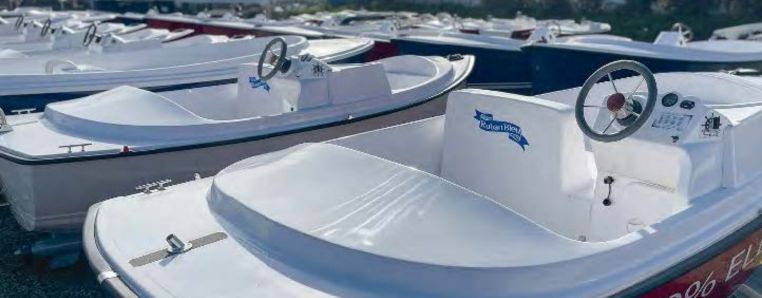The agility of a small company

Thibault de Veyrinas, 60, took over Ruban Bleu, a Nantes-based company threatened with closure, in 2006, and has now made it the European leader in the sale of electric boats, as well as offering turnkey nautical bases. A forerunner in electric propulsion, it is constantly developing innovative solutions, taking advantage of the agility of its small structure of nine employees based in Vigneux-de-Bretagne to adapt constantly.
How did you come to helm Ruban Bleu Electric Boats?
I’ve lived in Nantes for 30 years but I’m originally from Rennes. I come from a world that has nothing to do with boating, as I originally trained in the restoration of antique furniture and paintings. I chose to move to Paris to discover the world of business and work in different companies. Until one day I had the opportunity to work for a company that made equipment, small electronic boxes for computer training, just like language laboratories with booths and tape recorders. I have a technical background but a real commercial temperament. It’s a huge advantage because I can make the link between the two. This company, Cartel Europe, has filed for bankruptcy. I took it over, and we worked very well in Paris for fourteen years, until we won a major contract in Algeria for the Ministry of Education, which we were never paid for. We went out of business. It’s been a great adventure and a positive experience. It doesn’t work every time.
Four years earlier, I had set up an agency in Nantes and moved there. I spent a year and a half working in a food business before the opportunity arose to buy Ruban Bleu, which was on the verge of going bankrupt because its former manager, who took over in 2003 from the founder (1992) Jérôme Croyère, had died. When I took over the company in 2006, there were only four boats still being built in a building in the former Dubigeon shipyards on the Ile de Nantes, which were being shipped to Moscow. Then it was over. There was only one employee. It was very complicated at the outset because there was no transfer of the business, as the manager had disappeared. He worked the old-fashioned way, with no customer files and no plans. It’s been a very complicated adventure. It took an enormous amount of effort to put it all back together. I didn’t have any support. It was a lonely walk in the fog. In 2014, the Pays de la Loire Region and an investment fund acquired a stake in my company, providing invaluable support.
How did you find this company?
It was a friend who was looking to buy a company and had spotted it. He wasn’t interested in it but told me I should like it. Many people from Nantes came to visit, but the conditions of the takeover were so special that they were dissuaded. There were few assets and no one to pass them on. We had to clear the way and find a new market, and try to get the outstanding invoices paid…
Were you interested in sailing?
Yes, a passion for boats and the world of industry. Combining the two is really exciting. I felt in my element straight away. I’ve done a lot of sailing, especially dinghies and catamarans, just for fun, around Saint-Cast and Saint-Malo.
Have you developed the company’s project?
Two years after the buyout, the 2008 crisis hit, and we felt it in 2009. But we reacted well thanks to an unexpected development in the market. A number of mayors contacted us because they wanted to develop their local lakes with a water sports centre and were looking for a company to carry out the project. When you take over a company in these conditions, there is no strategy. Initially, we’re there to plug holes and respond to emergencies. You have to take ownership of the company’s content and do what you can do. It took a while for this to become clear. It was only afterwards that we asked ourselves how we could revitalise the company. The external element, the crisis, changed all that. We didn’t have many contacts any more, but we saw this new demand from local authorities. The first was the commune of Chanaz, in Savoie, which was desperate to set up a leisure activity to revitalise its site along the Savières canal. We have started to help them in this process. This enabled them to complete in one year a project that would have taken several years to bring to fruition.
Interview by : Éric CABANAS
Photo : Benjamin LACHENAL
